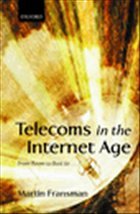The telecoms industry is one of the most important in the global economy. Without it the Internet and Information Society would not exist. But how does it work? How has it been changed by the Internet? Why was $2,500 billion wiped off its stock market value in 2000/1? How have its incumbent operators (such as AT&T, BT, Deutsche Telekom, France Telecom, and NTT) and their aggressive rivals (for example WorldCom, Qwest, and COLT) adjusted to the radical changes sweeping the industry? Why has Japan succeeded but Europe failed in creating the latest incarnation of the industry, the mobile Internet? These are some of the key questions analysed. The book begins with an explanation of the telecoms boom and bust, 1996-2002. It tackes the questions regarding who was to blame and why, and also examines the consequences of the bust. An analytical framework is created to understand the main forces driving the telecoms industry as it is transformed by the Internet into the infocommunications industry. It is shown that knowledge in its various manifestations and changes in knowledge are responsible for the key changes that have taken place. The foundation of the infocommunications industry comprises a combination of specialist technology suppliers (such as Cisco, Nokia, NEC, and Nortel) and network operators. Their changing relationship lies at the heart of the forces driving the industry. The author looks at how these changes have affected the struggles of the incumbent network operators and their new entrant rivals. He also analyses some of the main new entrpreneurs in the industry, looking at why they managed to enter so successfully, what has become of them, and why. The continuing changes in the knowledge base of the industry are examined, as are some of the latest developments in the mobile Internet. Finally, the future of the industry is confronted. The book is complemented by the interactive web site: www.TelecomVisions.com
Review quote:
Essential reading for anyone concerned with the past, present and future of the industry. (Long Range Planning)
A useful review of the telecoms boom and bust 1996-2002, together with an examination of the consequences of the bust. (Long Range Planning)
Fransman provides an essential outline of the perplexing issues that industry executives, regulators, policy-makers and consumers need to face up to if they want to understand what went wrong and what might lie ahead. (Times Higher Education Supplement)
This book should help managers and investors think more clearly - and clear thinking has been in short supply in this industry over the past five years. (Geoffrey Owen, FT)
... thoughtful and meticulously researched. (Geoffrey Owen, FT)
The telecommunications boom and bust of recent years has been one of the most remarkable industrial collapses in postwar history. This book analyses the circumstances and beliefs that gave rise to the boom and the subsequent crash of telecoms stock. The author provides analysis of the key players in the US, the UK, France, Germany, and Japan. The book is complemented by an interactive website: www.TelecomVisions.com
Review quote:
Essential reading for anyone concerned with the past, present and future of the industry. (Long Range Planning)
A useful review of the telecoms boom and bust 1996-2002, together with an examination of the consequences of the bust. (Long Range Planning)
Fransman provides an essential outline of the perplexing issues that industry executives, regulators, policy-makers and consumers need to face up to if they want to understand what went wrong and what might lie ahead. (Times Higher Education Supplement)
This book should help managers and investors think more clearly - and clear thinking has been in short supply in this industry over the past five years. (Geoffrey Owen, FT)
... thoughtful and meticulously researched. (Geoffrey Owen, FT)
The telecommunications boom and bust of recent years has been one of the most remarkable industrial collapses in postwar history. This book analyses the circumstances and beliefs that gave rise to the boom and the subsequent crash of telecoms stock. The author provides analysis of the key players in the US, the UK, France, Germany, and Japan. The book is complemented by an interactive website: www.TelecomVisions.com
